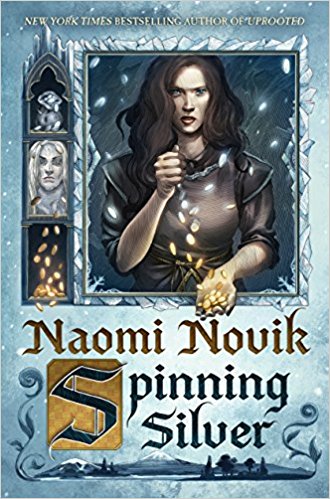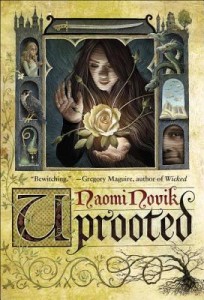 Spinning Silver by Naomi Novik
Spinning Silver by Naomi Novik Format: eARC
Source: supplied by publisher via Edelweiss
Formats available: hardcover, paperback, ebook, audiobook
Genres: fairy tales, fantasy
Pages: 480
Published by Del Rey on July 10, 2018
Purchasing Info: Author's Website, Publisher's Website, Amazon, Barnes & Noble, Kobo, Bookshop.org
Goodreads
Miryem is the daughter and granddaughter of moneylenders... but her father isn't a very good one. Free to lend and reluctant to collect, he has loaned out most of his wife's dowry and left the family on the edge of poverty--until Miryem steps in. Hardening her heart against her fellow villagers' pleas, she sets out to collect what is owed--and finds herself more than up to the task. When her grandfather loans her a pouch of silver pennies, she brings it back full of gold.
But having the reputation of being able to change silver to gold can be more trouble than it's worth--especially when her fate becomes tangled with the cold creatures that haunt the wood, and whose king has learned of her reputation and wants to exploit it for reasons Miryem cannot understand.
My Review:
 This is the story of Persephone at Night on Bald Mountain, with a bit of an assist from Rumpelstiltskin. In other words, Spinning Silver is another from the mind of Naomi Novik, a fitting follow up to the utterly marvelous Uprooted.
This is the story of Persephone at Night on Bald Mountain, with a bit of an assist from Rumpelstiltskin. In other words, Spinning Silver is another from the mind of Naomi Novik, a fitting follow up to the utterly marvelous Uprooted.
Spinning Silver is also a story where those myths and fairy tales, and all of the tropes that have been based on them, have been turned right on their pointy little heads, and where, in the end, the princesses all rescue themselves, without much, if any, help from the princes, thank you very much.
And where everyone gets what they’ve earned – nothing more and absolutely nothing less.
As fits a story that has been brewed from multiple source myths, Spinning Silver has multiple perspectives – and all of them are female. We begin (and end) the story from the point of view of Miryem, the Jewish daughter of a moneylender in a fairy tale land that has more than a passing resemblance to Russia.
Miryem is a young woman who does not believe in fairy tales. She has always seen the classic trope of the princess bargaining for wealth and riches from a fairy godmother as a cheat, where someone else does all the work and the princess gets out from under her obligations and wins by cheating someone else.
That’s Miryem’s reality. Her father is the moneylender in their small town, and everyone cheats him and spits on him because he is a Jew. They think it is right and proper to borrow money from him whenever they want and then pretend they have nothing to pay him back with when the money is due. And because Jews are hated and despised, he’s just supposed to take the abuse even though his own family is starving.
Miryem takes over her father’s failing business, and learns to spin silver into gold. It’s not magic, it’s just good business. But the cold and magical Staryk covet gold above all things, and when they hear her claim, they press her into their service.
But this is also the story of Wanda Vitkus. Wanda begins the story even poorer than Miryem. She is the daughter of the town drunk, who beats her and her two brothers mercilessly whenever he is drunk. Which is often. Wanda is every bit as starving as Miryem, because her father drinks away the money they owe the moneylender. But when Wanda begins working for Miryem and her family to pay off her father’s debt, both Miryem and Wanda are richer by the exchange, even if neither of them is aware they are helping the other.
And this is also the story of Irina, daughter of the local Duke, and her nurse Magreta. Once neglected and disregarded, Irina finds herself at the center of her father’s political machinations once events are set in motion. It is up to Irina to find a way to survive her marriage to the young tsar, a man who hides a terrible demon.
Working separately, Irina and Miryem, who would normally never meet, both discover that their world is under threat by competing magics, and that they only way they can save not only those they hold dear but save themselves, is to band together in a terrible plot to pit two gods against each other – and pray that the world survives their cataclysmic war.
Escape Rating A+: If you loved Uprooted, you will love Spinning Silver. If you love fractured fairy tales, or female-centric retellings of myths and legends, you will love Spinning Silver. This was marvelous and beautiful and even heartbreaking. And it is glorious.
These are myths that should not go together. They are from completely different belief systems and pantheons and traditions. And yet, in this version, they do.
If you read fractured mythologies, you may recognize Chernobog from Neil Gaiman’s tour-de-force American Gods. Or you may remember the name from Disney’s Fantasia. Chernobog is the dark god that is the evil in that particularly classic rendition of Mussorgsky’s Night on Bald Mountain.
Persephone, or Proserpina to use her Roman name, is the goddess of Hades and the consort of the lord of the Underworld in those mythologies. She’s the goddess who spends six months in the underworld and six months in the sunlit worlds.
And Rumpelstiltskin, of course, is the imp who changes straw into gold after making a bargain with a princess who then refuses to pay what is due. Miryem would say she wins by cheating. Not that Miryem doesn’t also rather loosely interpret the bargain she finds herself in, but she does all the work herself in the end.
I found myself feeling for all of the heroines in this tale, but particularly Miryem. Miryem is Jewish, and her circumstances reflect the difficulties that Jews faced in medieval and renaissance Europe, including Russia. There were few professions open to Jews, with moneylending being the one that was the most profitable, and became the most infamous. The Jews were blamed for everything from bad crops to epidemics, walled up in ghettoes, and murdered with abandon whenever things went wrong – or whenever the local lord needed to wipe out all his outstanding debts. Within the circle of her family she is safe and loved, but the world is not merely cold and cruel, but actively dangerous for reasons that are totally unjust but that she can’t fix. She is always in a no-win scenario – until she finds a way to break out.
Irina, Wanda and Magrete are equally trapped in situations not of their making. Both Irina and Wanda are forced to obey men who want to kill them merely because they are women. That they find ways to survive and conquer in spite of their situations is what makes them equally the heroines of this tale.
One of the important points in this story, and one that will resonate long after the book is closed, is a meditation on the Shakespearean quote, “A coward dies a thousand deaths, a brave man dies but once.” In Spinning Silver, the same is true for a brave woman. Each of the women of this story face multiple situations where they have to choose between dying a little at a time, or being brave in the face of imminent danger and taking the risk of standing up for themselves, no matter what the cost. For each of them it feels like a choice between striving for what is right and proper, for what is their due, or letting society and circumstances beat them down into less than nothing. They stand, and that’s what makes them heroines.
Surprisingly, considering how much these women have to fight along the way, love does conquer all and they do live more or less happily ever after, although not all in the same way. But in every case, it’s because they’ve earned it.

















2 thoughts on “Review: Spinning Silver by Naomi Novik”
Comments are closed.